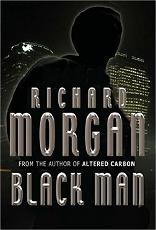
Black Man
Richard Morgan
630 pages
published in 2007
This was too much of a rerun for me. Black Man (published in the US as Thirteen for obvious reasons) has much the same plot as Morgan's first novel Altered Carbon. A worldweary, cynical but ubercompetent mercenary is blackmailed into going after a murderer and in the process uncovers a far greater and more horrible truth than he suspected existed or his employers necessarily wanted him to find out. As with every Morgan novel I've read so far it's an edge of your seat thriller, keeps you engaged to the bitter end, but five minutes later you're thinking "that's all"? I got the feeling Morgan was going through the motions, his heart not in it and it just seemed too slight to be worth a Clarke Award.
One big reason for the discomfort I felt was the silly worldbuilding. Morgan is excellent at creating a "realistic" sounding world, using infodumps, incluing and jargon to create an image in his readers' heads, but it doesn't work when he bases his future on the infamous Jesusland map. Remember 2006, after Bush had started his second (stolen) term and before the Congressional midterm elections, and how many of the liberal leaning blogs were despairing of their country? How it really seemed for a moment the US was split in two, with progressive coasts and an ignorant flyover country? Yeah? Remember also how fast that changed once the Democrats actually won an election? Well, it's this that Morgan bases his future on: the Jesusland maps and books like Thomas Frank's What's the Matter with Kansas. It was already dated when he was writing it, now just feels hopelessly silly. It makes it hard to take the world Morgan created seriously.
Which is not to say Black Man is a bad novel, just not a good novel. Morgan is always an engaging writer who keeps you sucked in his stories, even with a premise as silly as this and once I set myself over the background this was once again a good read. The problen is that Morgan seems to have wanted to do more with this and didn't quite make it.
It's the early 22nd century. America has split up, in what's pejoratively called Jesusland, the conservative and backward Southern/Midwestern states and the Coast states, rich, liberal and disdainful of the Jesusland rednecks. There's a sort of PFI colony on Mars, a corporate venture with heavy state backing which is not very popular. There's also been a huge explosion in genetic enginering in the late 21st century, which included the creation of completely new types of humans. In response to this international agreements have been reached banning most of this and keeping these "variants" locked up in reservations or at the Mars Colony. In a typical realistic Morgan touch, this ban is less adhered to in some countries than others, with China especially a hotbed of illegal research.
Carl Marsalis, the Black Man oif the title is one variant, a socalled type thirteen, supposedly the original human stock, more aggressive, less docile, not given to teamwork, and incredible masculine, which was culled out the race when we went from being hunter gatherers to being farmers. Morgan uses this hypermasculinity as a hook to hang his discussions of gender on, confronting the dumb masculine Jesusland with the feminised Coast States, with the former clearly being a dead end but where the thirteens could be seen as a new beacon of masculinity. Morgan is careful to undermine some of this gender determinism with a twist halfway through the book fortunately.
Marsalis is a superman ill fitted to a world with no real need for him hunting his own kind to stay out of the reservations. He gets careless in Florida, is entrapped and blackmailed in helping the Mars Colony project with a little spot of bother -- a serial killer forced down a returning Mars shuttle and now loose somewhere in America. Marsalis starts out reluctantly, but gets gradually sucked into the mystery in why this murderer could reach Earth and what he is doing, stirring up a lot of old secrets powerful people want to keep buried...
Next to the Jesusland nonsense, the genetic deternism and accompanying gender ruminations were the hardest to swallow. I sincerily doubt this idea of a hypermasculine strain of humanity culled out in Neolithic times and while you have to swallow the most fantastic nonsense to enjoy a lot of science fiction, this was all a bit too much in so recent a novel. Morgan manages to pull it back some, fortunately, or I might have thrown the book against the wall at some point...